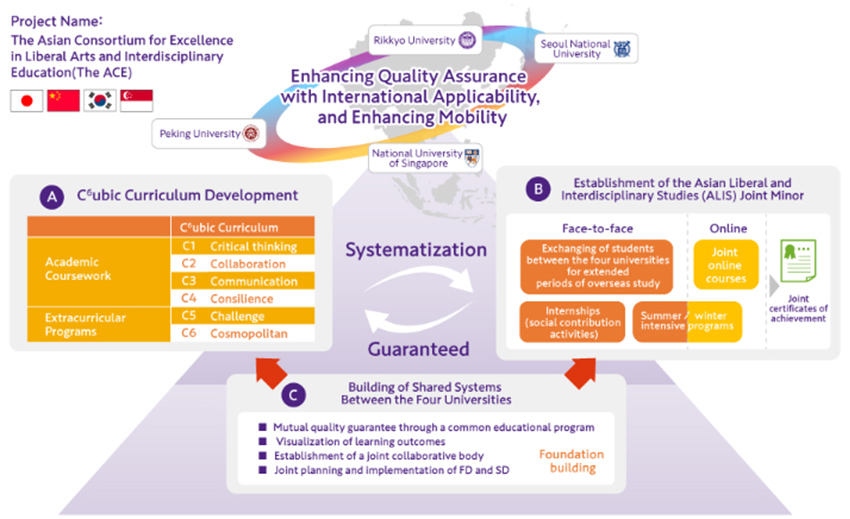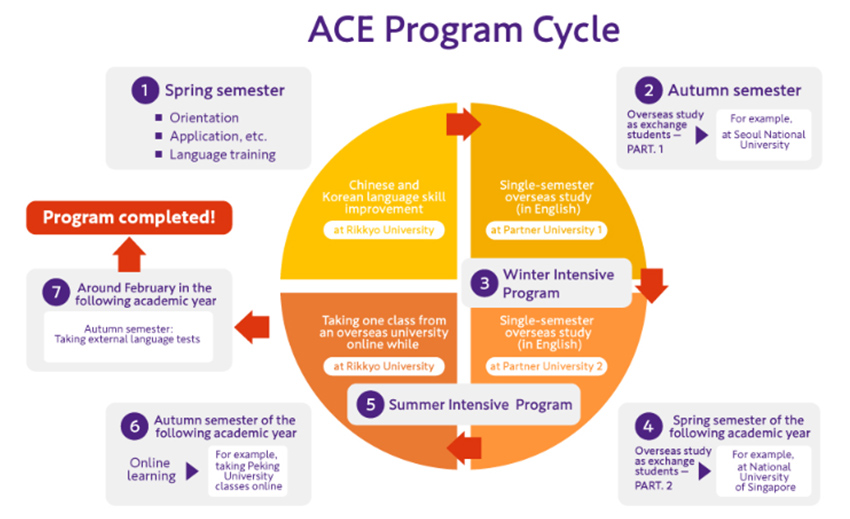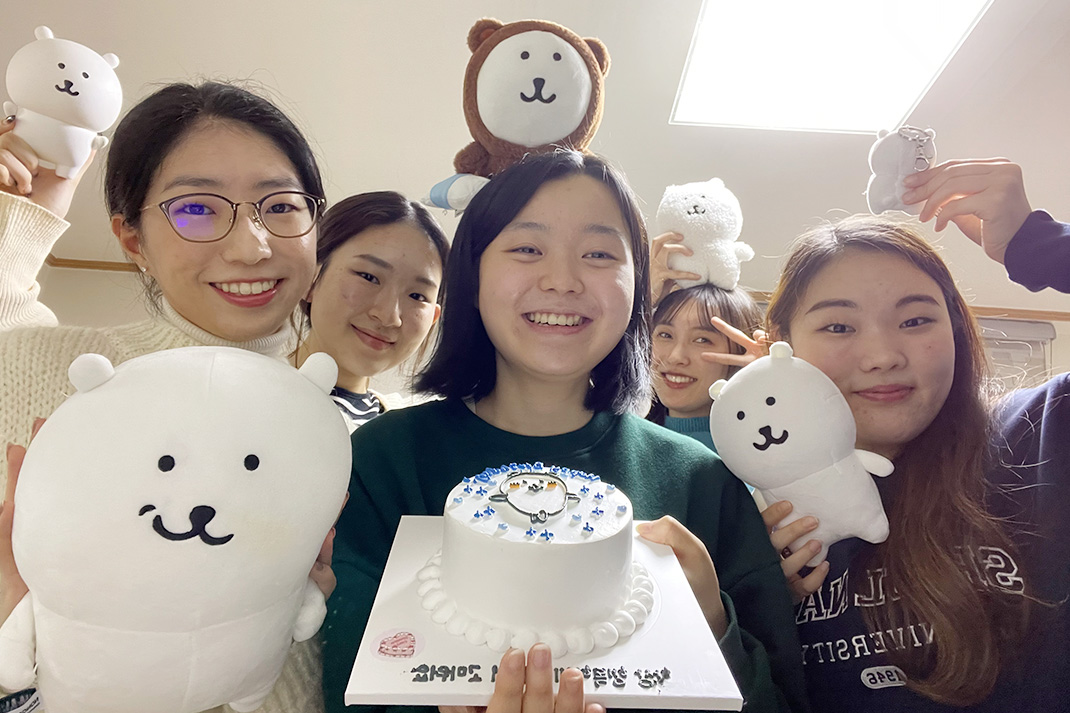The ACE Program has been selected as
an Inter-University Exchange Project for the 2021 Academic YearSTUDY ABROAD

Rikkyo University has signed a collaborative agreement with several of the Asia region’s leading universities – specifically, the College of Liberal Studies, Seoul National University; Yuanpei College, Peking University; and the University Scholars Programme, National University of Singapore – to form a consortium for international educational collaboration, with the aim of working together to develop liberal arts education in the East Asia and ASEAN regions. This initiative has been newly selected as a project eligible for funding support under the Inter-University Exchange Project: Support for the formation of Collaborative Programs with Universities in Asia, organized by Japan’s Ministry of Education, Culture, Sports, Science and Technology (MEXT) in the 2021 academic year.
In accordance with the agreement that has been signed, Rikkyo University, Seoul National University, Peking University and National University of Singapore will be forming the Asian Consortium for Excellence in Liberal Arts and Interdisciplinary Education (ACE). Through this consortium, the four universities will be working together to cultivate human talent that is capable of thinking seriously about, and taking action to address, the various issues facing Asia and the global community as a whole in today’s world, through international educational collaboration that involves multi-faceted collaboration between students living and studying in the Asian cultural ecumene, which is rich in both shared features and diversity, and other inhabitants of the region, in a manner that transcends both the boundaries between academic disciplines and geographical boundaries.
For GLAP, the credits earned in this program will be counted as credits for「Study Abroad 1・2」or free elective courses and can be counted toward graduation requirements.
In accordance with the agreement that has been signed, Rikkyo University, Seoul National University, Peking University and National University of Singapore will be forming the Asian Consortium for Excellence in Liberal Arts and Interdisciplinary Education (ACE). Through this consortium, the four universities will be working together to cultivate human talent that is capable of thinking seriously about, and taking action to address, the various issues facing Asia and the global community as a whole in today’s world, through international educational collaboration that involves multi-faceted collaboration between students living and studying in the Asian cultural ecumene, which is rich in both shared features and diversity, and other inhabitants of the region, in a manner that transcends both the boundaries between academic disciplines and geographical boundaries.
For GLAP, the credits earned in this program will be counted as credits for「Study Abroad 1・2」or free elective courses and can be counted toward graduation requirements.
| The Partner Universities |
|
|---|---|
| Application Requirements |
|

Overview of the ACE Program
The students that were enrolled and selected by GLAP, and who it has been decided will be able to participate in the ACE Program (hereinafter referred to as “ACE Program students”) undertake one year (two semesters) of overseas study at partner universities, as well as winter and summer intensive programs, the taking of classes at partner universities through online study after returning to Japan, and study to enhance their language skills (including English, Chinese and Korean). While participating in the ACE Program, the ACE Program students receive financial support, including a monthly scholarship, travel expenses, and payment of fees associated with enhancing their language skills (Chinese and Korean).
The ACE Program comprises the seven core blocks listed below (Core Block 1 to Core Block 7). In principle, ACE Program students take all seven core blocks. After completing the specific core blocks, those students that have obtained the required number of credits are awarded a certificate of completion of the Asian Liberal and Interdisciplinary Studies (ALIS) international joint minor.
The ACE Program comprises the seven core blocks listed below (Core Block 1 to Core Block 7). In principle, ACE Program students take all seven core blocks. After completing the specific core blocks, those students that have obtained the required number of credits are awarded a certificate of completion of the Asian Liberal and Interdisciplinary Studies (ALIS) international joint minor.
ACE Program Cycle
Core Block 1:Intensive language learning, and taking of foreign language examinations (in English, Chinese and/or Korean) offered by external examination providers, after it has been confirmed where the student will undertaking overseas study
---------- Starting overseas study -----------
Core Block 2:Overseas study as an exchange student for the first semester at Partner University A
Core Block 3:Winter intensive program
Core Block 4:Overseas study as an exchange student for the second semester at Partner University B
Core Block 5:Summer intensive program
---------- Return from abroad -----------
Core Block 6:Third semester online learning provided by Partner University C(Courses at Rikkyo University will be taken simultaneously)
Core Block 7:Testing progress by having students re-sit language tests
---------- Starting overseas study -----------
Core Block 2:Overseas study as an exchange student for the first semester at Partner University A
Core Block 3:Winter intensive program
Core Block 4:Overseas study as an exchange student for the second semester at Partner University B
Core Block 5:Summer intensive program
---------- Return from abroad -----------
Core Block 6:Third semester online learning provided by Partner University C(Courses at Rikkyo University will be taken simultaneously)
Core Block 7:Testing progress by having students re-sit language tests

ACE Program (Asako Kakihara Enrolled in 2019) Studied at Seoul National University and National University of Singapore

Birthday party at SNU(right)
As a member of inagural class of the ACE program, I went to Seoul National University (SNU) for the first semester starting September 2022 and am currently studying at the National University of Singapore (NUS) for the second semester starting January 2023. Although both universities are both in the Asian region, there are two differences between them. The first is language: at SNU, there are only a limited number of courses offered in English, and I had more opportunities to interact with international students in class than with local students. On the other hand, at NUS in Singapore, where English is their official language, a high percentage of students are local students, and their English, called "Singlish", has distinctive local accent which requires more concentration than usual to get used to. Among other Asian countries, I find Singapore to be an exciting environment that challenges my English language skills. The second is class style: at SNU, lectures, presentations, group discussions, etc. are included in class time, but at NUS, there is a separate tutorial session for each subject in addition to the lecture session. Even though there are enough students to fill a large auditorium for a lecture session, students are divided into classes of up to 20 for tutorial session and work on discussions and group projects with their assigned members. This tutorial session is similar to GLAP's interactive approaches. Also, in each class at NUS, in addition to the professor's lecture, the professor or Teaching Assistant (TA) will summarize the content of each class through facilitation, which allows students to learn more deeply about the subject. Finally, I also felt differences depending on which country I was visiting. In Singapore, a multinational country, interaction with foreigners is so common that I was rarely treated differently as an " international student," while in Seoul, where many people around me were non- native English speakers, I experienced a typical life as an "international student" by being exposed to the local culture and sharing it with each other.
